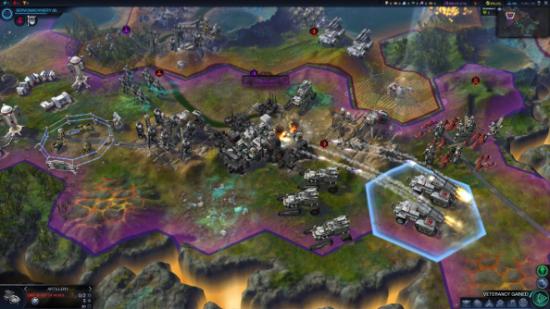The preview build of Civilization: Beyond Earth only gives you 250 turns. It amounts to about four hours of play, unless you’re trying a “small-Civ” strategy and just trying to win the game on the back your first colony. It’s enough time to found a couple cities, fight some hostile alien fauna, complete a Wonder or two, and maybe even fight a couple of wars against another faction.
It’s enough time, in other words, to do all the things you’re used to doing from Civilization. But it’s not enough time to see whether Beyond Earth really ends up somewhere new, or if it’s simply a new look for an old friend.
Planning my war takes ages. This is my Operation Barbarossa. Long-range siege artillery, support gunners, infantry, and light armor spend several turns filings into position along the long, bitterly contested border between my African Union and the Pan-Asian Cooperative.
The animosity goes back to the start of the game. On a broad plain between our capitals lies several pockets of important resources. My colonists got there first and grabbed the prime real estate, but the PAC got there a few turns later and planted a spoiler city to both divide my fledgling empire and to snipe some of the resources that otherwise would have fallen into my expanding borders.
But my African Union came to this world with a healthy stack of cash and a cargo full of aristocrats. This was what I decided was aboard my landing craft before the game actually began. It meant that, unlike the Asians, my faction had been banking cash since Turn 1. A few savvy trade deals later, and I was sitting on a massive warchest. So while the Asian city of Quyen was a minor thorn in my side, I was a far bigger problem for them as I blew my bank on claiming all the key hexes around their city.
The Pan-Asian Cooperative leader, Daoming Sochua, went ballistic, demanding that I stop claiming land that her people regarded as theirs. Then she started militarizing the border, and it’s been a cold war ever since. But I have all the important friends in the world, and she’s isolated. Now it’s time to remove Quyen from the board and unite the two halves of my empire.
Spearheading my offensive are a handful of veteran Marine and Gunner units. They have been with me for most of the game, and they’ve been fighting almost continuously. First there were the battles in the southern hills and forests around my capital as I tried to create a safe space for my workers and trade convoys to operate.
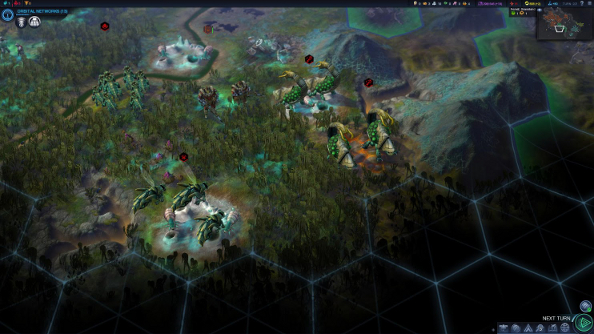
Then there was a long, 50-turn campaign in the northeast as I tried to get a third colony established. Unfortunately, the most desirable location was also swarming with hostile aliens and clouds of choking miasma. Just to get to the hives alone required hacking through forested hills, and the more I pushed against the aliens, the more aggressive they became.
I find myself fighting more in Beyond Earth. The aliens are a more dangerous threat than the barbarians of Civilization, in large part because the barbarians don’t employ giant siege worms straight from Dune to go eat entire cities in one go. And the aliens enjoy homefield advantage: my troops slowly choke to death in the green clouds of miasma, while the aliens are healed by it. Eradicating their nests does solve the problem in a given region, but it can be tough to reach them.
The upshot is that my veterans are have leveled up multiple times. While they haven’t gotten any interesting perks beyond slightly improved attack power, they’re still a lot better than the they were when they were first built.
Waste Not
The fact that these troops are relevant at all highlights one of the most crucial differences between Civilization and Beyond Earth. Civilization is about the march of progress. No sooner have your Roman legions and catapults finished winning a war than they are outmoded by the arrival of pikemen and crossbowmen. If you can pay the upgrade fees, you can keep your veterans. But in most cases, a Civilization army is a temporary expression of scientific and industrial prowess. Did you have the know-how to build the best units in the game, and the bandwidth to churn them out in droves? Then enjoy your fleeting military superiority.
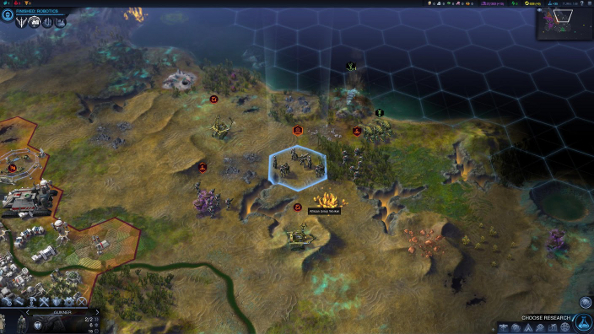
Beyond Earth isn’t really about climbing a ladder of progress. You don’t move “forwards” along a tech tree that inexorably leads to a handful of endgame technologies. It has a tech web where the vast majority of new units, buildings, and upgrades are entirely optional. While you may be able to pick most of them up eventually, they’re not mandatory.
This is a key difference. Civilization is about winning the race of progress, but progress always looks the same. Beyond Earth is about choosing how to progress. The biggest choices are about research priorities, but that theme of choice and customization runs throughout the game.
At almost every turn, you are given choices that will subtly change the character of your civilization, and leave you with a permanent buff. In some ways, it’s the Risk Legacy of the Civilization series.
For instance, almost every new building causes an event to pop up where you have have a choice of two effects that can be tied to to the building’s base stats. Do you want to improve your Ultrasonic Fence so that it scares-off aliens up to a radius of three hexes around your cities, or do you want to forego the extended range so that a mobile version can be attached to trade convoys, effectively immunizing them from alien molestation?
Those choices are the smallest in the game, but think about how they interact with everything else. There’s another building that can either give you a little extra production or an extra trade route. If you choose trade again, now you’ve got some real potential to be a major trade power, as hordes of alien-immune convoys race across the globe, bringing wealth, research, and culture home to you.
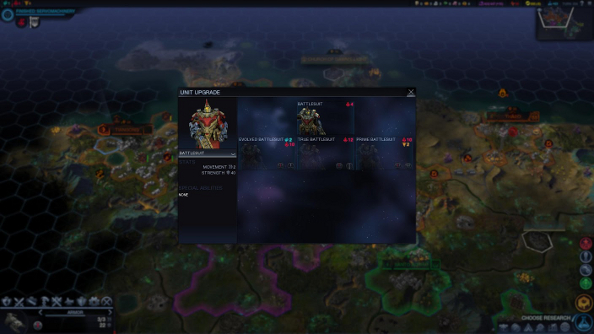
Just as in Civilization 5, you also level-up your civilization in terms of virtues, choosing to emphasize militarism, prosperity, industry, and science. Each new virtue gives you some kind of bonus or reward, and as you invest more heavily in one tree, you get even more bonuses.
So after only a few dozen turns, your civilization is probably off in a completely different direction than someone else’s. I found that the resources I needed and my game strategies changed a great deal from one game to the next, just because of the bonuses I took and technologies I chose to research. That, in turn, dramatically reshaped what I needed in terms of resources and settlements.
That also means that obsolescence doesn’t really exist here, at least within this preview. My early game units scaled with my current level of advancement, and while my Marines might not fare well against the new Battlesuits I’m deploying in the late-game, they’re not completely outmoded, either. Especially if they’ve got a few campaigns under their belts. And if I make a few more advances, they’ll get another set of upgrades to help keep them in the game.
Future Imperfect
Finally, Daoming Sochua sends me a message, demanding to know why I have so many forces along our border. I shrug, and decide to let her in on the secret: it’s time for her and her people to die.
Honestly, I’m not sure why I’m fighting Daoming. It’s turn 200 and I kind of want to stomp someone before the game calls time. Since Daoming and I have been scuffling over our border for the entire game, she’s first in line.
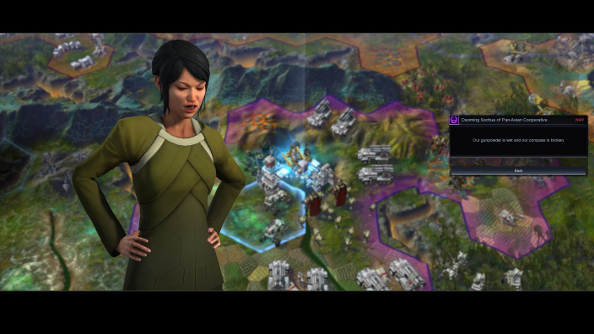
But this points to my major misgivings with Beyond Earth: it’s near-complete lack of character. I honestly have no feel for what this world is like, or what societies are competing for mastery. I don’t know what the hell the Pan-Asian Cooperative stands for, or what my African Union is all about. I don’t know if Daoming is just an AI crunching the same numbers as everyone else, or whether she has a personality that predisposes her to one course of action over another.
Nor do I have a sense of competing visions in this game. Supposedly I’ve been making choices about what animates my society. I’ve consistently chosen the “Purity” affinity, which theoretically means I’m all about keeping humanity recognizably human. This sets me apart from those “Supremacy” types who will embrace bionics and whatever else it takes to thrive, or the “Harmony” people who want to basically create some kind of telepathic commune between all living things.
But honestly, it just seems to control what units and upgrades I unlock. It’s purely utilitarian. What’s missing is any sense of the stakes behind these disagreements. I’m going for Purity because I wanted a guy in a freaking Battlesuit, and that’s exactly what I’ve got. As for what this means for the society I’m building, or my relationship with the planet and the other factions? Beyond Earth doesn’t seem too interested in showing the answers to those questions.
Firaxis were clear from the start that they were not making Alpha Centauri 2, and I’ll cop to the fact that I was skeptical of the direction they were going with their fiction. But that’s not actually the problem here. The problem is that Beyond Earth barely seems to have any fiction at all. It’s a thin thematic veneer over the resource optimization game that you’re playing.
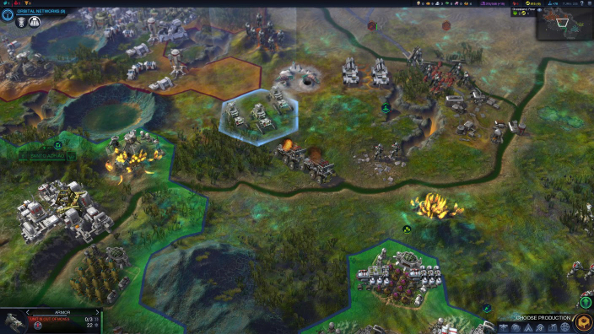
Mind you, it’s a good resource optimization game. But it ends up lacking the special rewards of both Alpha Centauri and the other Civilization games. Alpha Centauri told a haunting, thought-provoking, and darkly humorous story about competing ideologies battling for control of a self-aware planet. Civilization, as much as it may seem like the civilizations are almost interchangeable, is actually packed with character and rewards. Every Wonder and technology comes with a nice epigram. Your cities teem with life. The music reflects the changing world. The foreign leaders suggest distinctive personalities, so that every conversation with Montezuma feels like dealing with Joe Pesci in Goodfellas, while Alexander is a spoiled rich kid who wants to steal my girlfriend and egg my car.
Beyond Earth feels static by comparison. The flavor text isn’t all that flavorful, and the voice acting in the game is deeply uninspired. Voice actors for one character are employed to quote another, ensuring that no personality survives any of the line readings, or connects to any of the individual faction leaders.
There are bits and pieces of personal testimony from the faction leaders that pop-up now and again, and those do shed a little light on their character and the lessons they’ve drawn from Earth’s slow demise. But there’s not much of it, and none of it finds an expression within the game itself.
You know someone at Firaxis is phoning it in when your Wonder results in a dismal little pop-up schematic that somehow makes your new scientific marvel less interesting than unboxing a new wireless router.
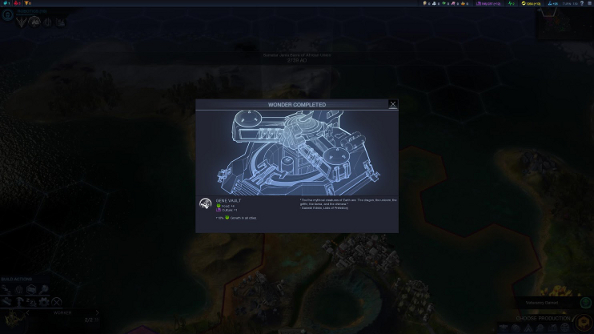
As far as I can tell in this preview build, the big questions that Beyond Earth purports to be wrestling with are entirely academic. Yes, yes, learning how humanity can ethically survive in this hostile alien wilderness is all well and good, but let’s focus on what really matters here: am I gonna build a generator on this river tile, or is it going to be a farm? Hey sister, can you spare a little Titanium?
Quo vadimus?
I hate writing critical previews, because there’s always the chance something astonishing will happen around turn 500 that I just can’t see coming by turn 250. Maybe some of this stuff will turn out to be placeholder and in a month this will all seem like unwarranted snark.
I don’t think Beyond Earth is going to be a bad game. For crying out loud, I’ve sunk like ten hours playing the first third of it again and again. But it was never a question as to whether Firaxis could make a good 4X in a new setting. The question was whether the Beyond Earth would feel as new and exciting as the setting would seem to promise.
On that score, I feel like Beyond Earth misses the mark. It is very polished and strategically demanding. But it doesn’t fire the imagination like Alpha Centauri does, nor does it seem as fresh as a game like Endless Legend. After 250 turns, I still feel like I’m searching for new worlds to conquer.
